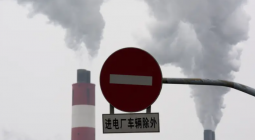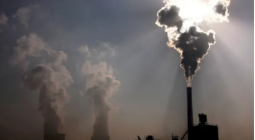‘They seem to have gone coal mad’: major parties sing as one, but Upper Hunter voters are not so sure
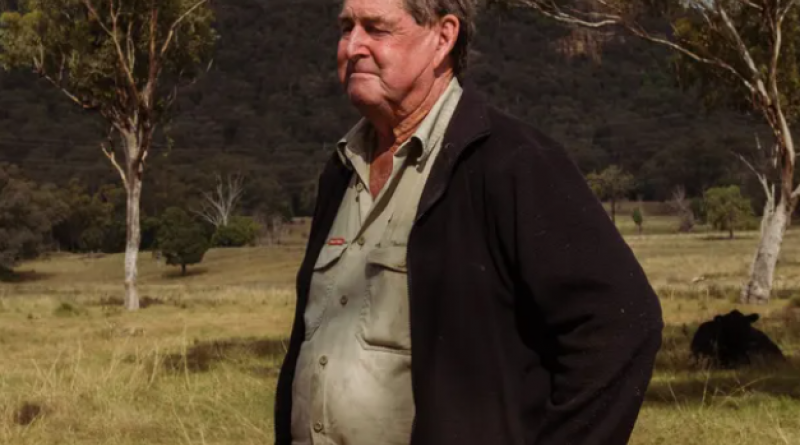
Hotly contested NSW byelection comes amid growing doubts about the economic viability of the industry and the future of the region
by Michael McGowan Photography: Isabella Moore
Standing on a hill overlooking the sprawling maze of paddocks he’s worked all his 71 years, Ian Moore rattles off the names of Nationals MPs he’s supported in the Upper Hunter during his 50 years as a member of the party.
Col Fisher, the local MP for 18 years from 1970, lived just over the hill from Moore’s farm in Jerrys Plains, a tiny village west of Singleton. Fisher was “an honourable” man, he remembers. So too George Souris, who held the seat from 1988 until his retirement in 2015. “A gentleman,” Moore says.
More recently though? Of Michael Johnsen – who resigned in March in the wake of accusations he raped a sex worker in the Blue Mountains in 2019 – accusations he strenuously denies – the less said the better. And Dave Layzell, the candidate preselected to replace Johnsen at next Saturday’s byelection? Well, he’s just not sure.
Layzell is from “the wrong end of the valley”, for one thing, but more importantly, this byelection campaign has Moore thinking seriously about the direction of the party he has always supported, and the future of people like him in the Hunter Valley.
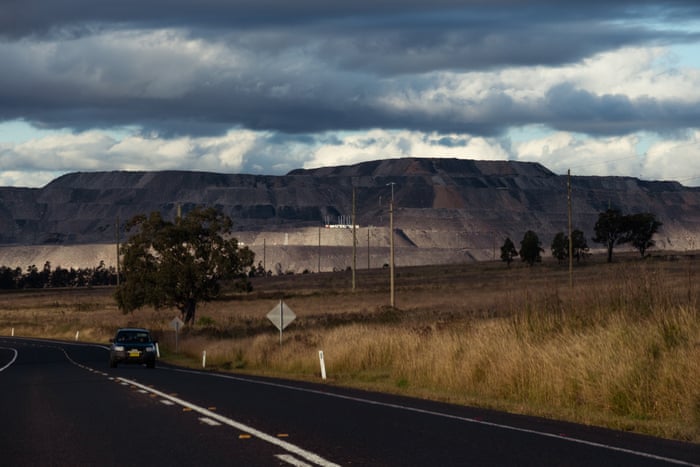
At the front of his mind is the same issue that has dominated the campaign: coal.
“The National party have always been for the regional people,” he says. “They were never anti-coal, but what worries me is they seem to have gone coal mad. No one wants to stop coalmining. You can’t. We just don’t want to see it keep increasing, increasing, increasing.”
The byelection sparked by Johnsen’s resignation would have been hotly contested no matter where it was. If the Nationals don’t hold the seat, the Coalition government will be in an even more precarious position, after it was forced into minority rule on Thursday when Gareth Ward moved to the crossbench, and the party of the bush will have lost a once-safe seat it has held continuously since 1931.
But set in the heart of coal country, the battle for Upper Hunter has also become a proxy in the interminable energy wars which have gripped Australia’s political class for more than a decade. Amid growing doubts about the economic viability of coal – and increasing international pressure on Australia to adopt more ambitious emissions reduction targets – a debate that had rumbled on for decades about the valley’s economic future and the environmental cost of the industry it relies on has become intensified by the glare of Macquarie Street.
Vying to become coal’s ‘favourite child’
For most candidates, the arithmetic is simple. In the first weeks of the campaign, all of the four parties with a chance of winning the seat – the Nationals, Labor, the Shooters, Fishers and Farmers, and One Nation – engaged in a campaign to see who could pray harder at the altar of coal.
Labor’s candidate, Jeff Drayton, a former miner and union official, said he was sick of “demonisation” of coalminers, while the party’s leader, Jodi McKay, raised eyebrows within her own party when she announced she did not support a moratorium on new coalmines and said she supported the expansion of the industry.

The deputy premier and leader of the NSW Nationals, John Barilaro, declared that coal would be in the region “forever”. One Nation’s Dale McNamara, a businessman from Singleton, said at the launch of his campaign that coal “is my life”.
The pro-coal rhetoric was such that when Guardian Australia spoke to Sue Gilroy, president of the Singleton Business Chamber and the Shooters’ candidate for the election, even she conceded the campaign’s early weeks had become something of a pantomime, as the candidates vied to become coal’s “favourite child”.
“It was like, ‘I like coal better than you like coal’, ‘No, I like it better.’ To be honest with you, in those first few days I thought if I’ve got to keep telling people how much I like coal, I mean … look, coal to me is about people, it’s about jobs and putting food on the table,” she says.
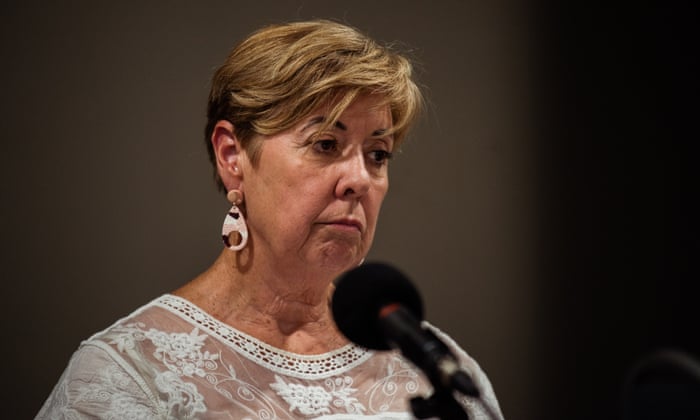
“Coal is very important to the Upper Hunter. At this point in time we need it and we can’t ignore the fact that it provides a lot of jobs and supports our economy and our infrastructure … but that doesn’t mean we don’t need to think about what’s next.”
It’s easy to understand the political imperative to win the mining vote. According to Muswellbrook council, the total annual economic output of the area is about $6.9bn. The mining industry contributes more than half of that: some $3.8bn. The Minerals Councils estimates that the total mining workforce across the Upper Hunter is about 7,320, with more than 1,000 local businesses also supplying the industry.
The influence of the industry is everywhere you look. As Fiona Plesman, general manager of Muswellbrook council tells the Guardian: “If you do your grocery shopping in town any evening of the week, most of the people you see will be wearing fluoro.”
Most obvious, though, is the physical impact on the landscape. On the drive north from Muswellbrook, picturesque paddocks filled with cattle are set against a harsher backdrop. Less than 3km outside town, MACH Energy’s Mount Pleasant coalmine looms in the background. Owned by Indonesia’s Salim Group, the mine already has approval to extract 10.5m tonnes a year and is seeking approval to extend its operations by a further 22 years and double the amount of coal it extracts annually.
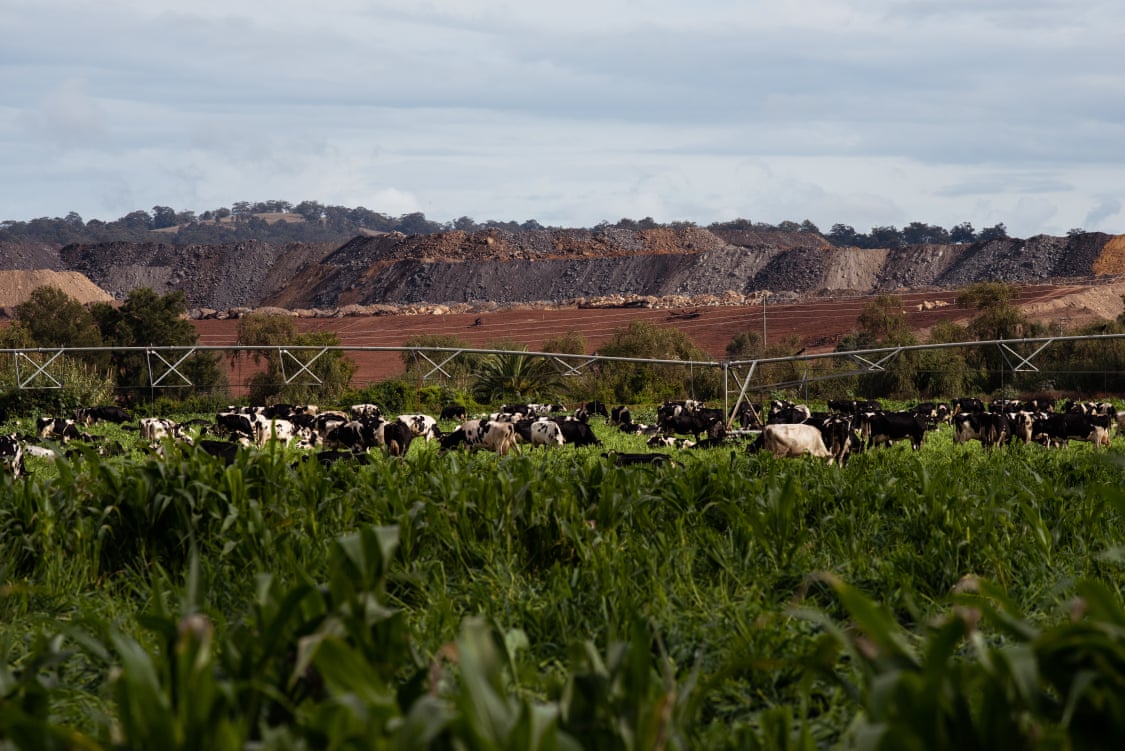
Head west, and the overburden from the huge Mount Arthur mine could easily be mistaken for a mountain in the distance. The largest mine in the Hunter, one local described it to the Guardian as “a hole big enough to swallow Muswellbrook twice”. Its owner, BHP, has also applied applied for an extension until 2045.
A little further along that road west is Denman, a town of neatly manicured lawns, quaint houses and a multimillion-dollar sports complex funded by Glencore as part of its approval for another mine, Mangoola, which was last month given the green light to extract an additional 52m tonnes of coal over eight years.
The Denman rugby league club’s president, Ben Hagan, is a miner at Mangoola and, as he points to the brand new tackling bags, fridges and pie heaters funded by Glencore, he talks about what the extension means for him, his wife, Lillian, and their six children.
“It basically means I won’t have to leave town to find another job,” he says.
“Mining has given me a life I wouldn’t have otherwise. I probably wouldn’t be able to stay here if it wasn’t for the mines.”
Originally from nearby Scone, Hagan moved to Denman in 2010 to become captain-coach of the football club. Since then, they’ve made the town their home. Hagan, like many miners, is hesitant about speaking to the media, fearing “negative” coverage. But beyond the physical investments made in the footy club, he is evidence of the attachment to the industry in the region.

“Denman, I don’t know what it would be like without the mines, I really don’t know what would be here,” he says.
“If you look at our committee here, use that as an example: just about everyone on it works on the mines or related to the mines. But it’s not just about footy, it’s the centre of our social lives, really.”
Questioning coal-at-all-costs
Kirsty O’Connell is late for a radio interview, and her campaign adviser, Graham Nuttall, a former adviser to the independent federal New England MP Tony Windsor, is checking his phone nervously. “Tell them I’m so, so sorry,” she pleads.
It’s Monday afternoon. We’re at O’Connell’s farm, just outside Aberdeen. Her three-year-old daughter is standing on a piece of play equipment, and wants to know where her dad, Matt, is.
“He’s milking the cows, darling,” O’Connell shouts across the yard.
A volunteer has stopped by to drop off a campaign sign and talk about a campaign event in Muswellbrook later that night. There are four large geese charging around the yard, honking and squawking in the deeply chaotic way of geese.
“Where were we?” she asks.
O’Connell, an fifth-generation Upper Hunter farmer, has emerged as an unlikely dark horse in the race to win the seat.
Unassuming and disarmingly overawed by the attention her upstart campaign as an independent candidate has attracted, she found herself in the centre of a media storm when she was endorsed by the former Liberal prime minister Malcolm Turnbull, who said she would “give the Upper Hunter the independent voice it deserves”.
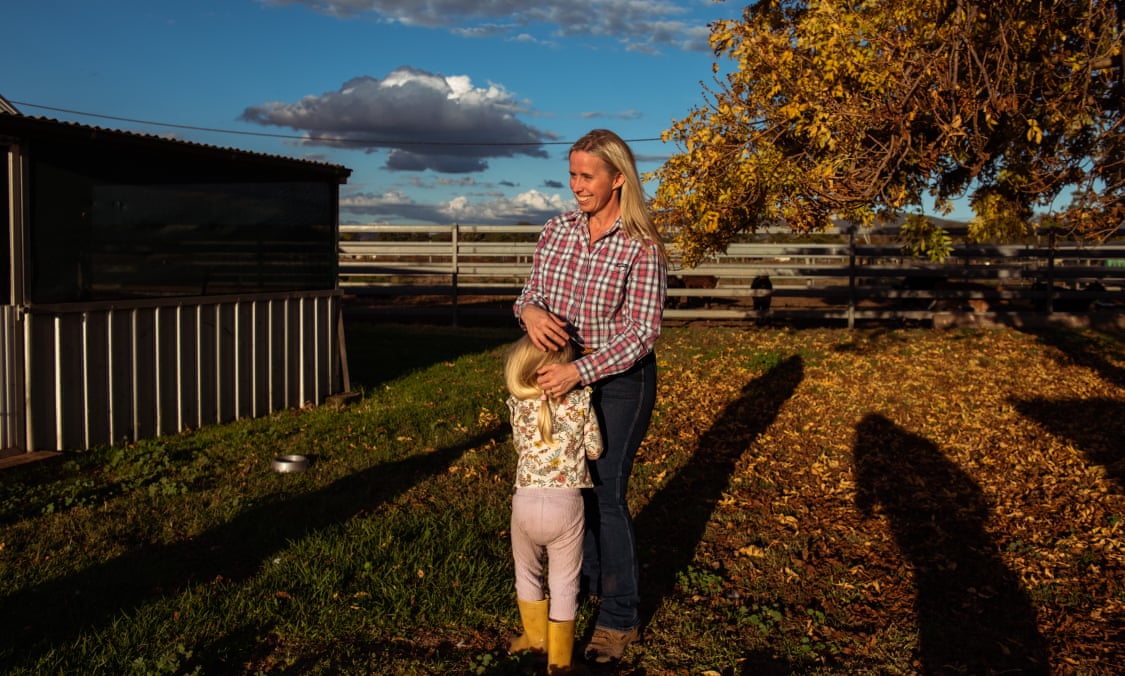
It attracted a furious response from Barilaro, who accused Turnbull of “treachery”, and from the Sydney radio shock jock Ray Hadley, who used a photo of a Labor volunteer moving one of her signs near a Singleton pre-polling booth to launch a petulant attack in which he called O’Connell “the de facto Labor candidate”.
A longtime community campaigner who has called for a moratorium on new coalmines in the Hunter, O’Connell is one of the few candidates questioning the coal-at-all-costs mantra.
To her mind, the parties have misjudged the mood in their pursuit of the mining vote. She believes the prospect of the equivalent of six Adani-sized mines planned within a few kilometres of Muswellbrook, coupled with the prevailing economic winds, has people thinking seriously about the valley’s future.
“I’ve had so many people – people I know from school, from pony club, all different parts of my life – who have said to me: ‘It’s good that we’re having this conversation’,” she says.
She points to Mount Pleasant, about 10km away, and talks about air quality, the noise from the uncovered coal trains that run day and night behind her property, and the fear of many in the agriculture industry that the opportunity cost of coalmining has reached a point where the Hunter’s other vital industries will be forced out of the region.
“With the exception of a few candidates everyone else in this election is going, ‘Keep ripping her up, boys, this is a great idea.’ Which is just rubbish. I am not anti-mining. Probably a third of my family work in the mining sector, but it boggles me that the NSW government is still assessing applications on a case-by-case basis.
“They’re still saying, we don’t need to take into account the cumulative air quality situation, or what is already happening with the ground water and surface systems that we all depend on, which support a multibillion-dollar thoroughbred industry, a $700m wine and tourism industry, all of our towns’ drinking water.
“The thing is, this is not a new idea for us. We’ve been waiting for years to finally have a conversation about what on earth is going on in the Hunter and the Upper Hunter and what we do next. People are worried about the future, but they just want to get started on a plan. They want some certainty.”
‘It’s a lot worse now’
Wednesday night at the Scone RSL. As the sound of an MC calling out the bingo numbers rises through the floorboards, in a room upstairs 11 of the 14 candidates are making their case to a crowded room of voters at a forum held by the NSW Farmers Association.
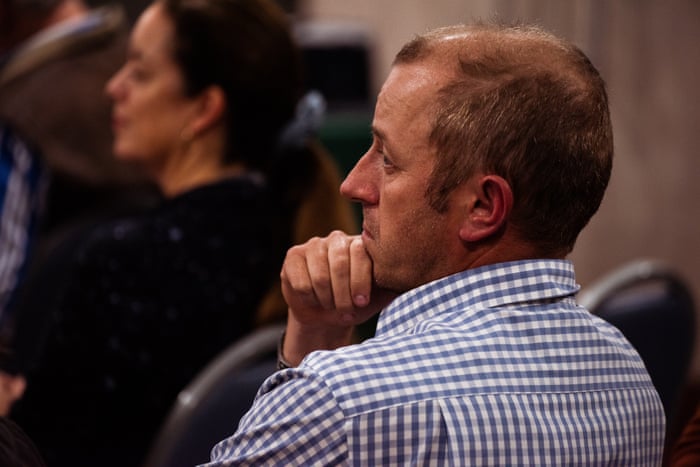
Only about half an hour north of Muswellbrook, Scone is not coal country. As Drayton says during the forum, Upper Hunter is “an electorate in three parts”.
“When you go to Muswellbrook and Singleton you talk about industry and mining,” he says.
“Up here it’s more agriculture and equine. You go to Gloucester and it’s different again.”
In other words, while the race to win the Upper Hunter has been predicated on the belief the more densely populated towns of Singleton and Muswellbrook will swing conservative on energy policy, the candidates also know this room full of farmers won’t necessarily love the tattoo-coal-on-my-chest rhetoric coming from their campaigns.
It makes for some uncomfortable moments. When Layzell responds to a question about protecting prime agricultural land from “other industries” by saying there’s “nothing I think more dearer to the National party”, a few jeers break out among the crowd. When he defends the sale of Scone Tafe as a “great deal”, someone in the crowd yells out: “What a load of rubbish.”
These are O’Connell’s people, and she gets loud applause for her answers on land use, the mouse plague and the government’s failure to cancel expired mining exploration licences in the Hunter.
Whether O’Connell’s message will resonate across coal country though is uncertain. At least one prospective independent candidate pulled out of the race out of a belief that support for the Nationals was too high to overcome, and across the valley there is plenty of evidence of rusted-on support for a party which has held the seat since before the second world war.

One of them is Lorna Driscoll, who owns the general store in Aberdeen. She’s run the shop for 44 years, and was born and raised in the town. There’s a Dave Layzell sign in the window, and she enthusiastically hands the Guardian a National party pamphlet as she talks about the candidate’s four daughters and engineering degree.
Aberdeen, she says, has changed “a lot” during her lifetime: “We used to have a sawmill, we used to have a meatworks, the tannery is gone. They’re all gone.
“That’s why the coalmines are very important, because they create jobs,” she says.
But, she adds a caveat that goes to the heart of the land use conflicts that typify the Upper Hunter: “I don’t support them in our area, but where they are.
“I’m more farming and that sort of thing,” she explains. “I don’t think they should be cutting into the farmers’ land, because the farmers were here first.”

And then there’s Ian Moore. A second-generation farmer, Moore’s family history in the valley dates back to the 1840s. He’s lived on this property his entire life, and he casually points out landmarks on the horizon with pinpoint accuracy, despite being legally blind.
Moore has been thinking about a meeting he had with the now-retired NSW Nationals minister Duncan Gay about 10 years ago. On his first visit to Parliament House, he sat in Gay’s office and talked about the future of farming in the Hunter Valley during a surge in new coalmine approvals across the region.
“I remember Duncan saying, ‘We’ve got the balance wrong, we need to fix it.’ Well that was 10 years ago. It’s a lot worse now.”
You can hear what he’s talking about. The low rumbling in the distance could be from any of the dozens of huge open-cut mines that loom over this valley, a handy metaphor for the way the debate about the future of the industry has dominated the election.
“That’s what worries me about the Nationals now. Barilaro is coalmine mad. The night we voted for the candidates, I said to him, ‘John, I’m sick of the Nationals being called the mining party.’ I said we’ve got the balance wrong. He said, ‘Yeah I agree, we have got to change it.’ The next day they announced the candidate at one of the mines in front of a 300-tonne dump-truck. That’s pretty well backing coal, isn’t it?”
Like everyone here, Moore is at pains to say that he is not anti-coalmining – in fact, like most, members of his family are involved in the industry. But he has his own history with mining.
On 4 June 2008, a group of prospective coalmine owners hosted a meeting for the few hundred residents of Jerrys Plains.
The mine was called Doyles Creek, and in the years that followed it was at the centre of an investigation by the Independent Commission Against Corruption that led to the conviction of the former Labor primary industries minister Ian Macdonald for public misconduct over the lucrative deal, which was subsequently overturned and a retrial ordered. Macdonald maintains that he’s “absolutely” innocent.
Long before that, though, Moore was fighting his own lonely battle to stop the mine. Shy and diffident by nature, he found himself vaulted into a media storm that would take him from the land and environment court to Icac.
“I hated being on camera, hated it,” he says. “But, look, I’m not a liar or a cheat, and I don’t want to be a bloody maverick either. But I am prepared to fight for something.”
Moore won that battle but the ongoing land use conflict in the Upper Hunter has him and many like him wondering how long they have left in the valley.
“There aren’t many people like me left,” he says.
Still, he only gives half an answer when you ask if he plans to vote for the National party next Saturday.
“I think I know who I want to win, but I’ll let you figure that out.”
14 May 2021
The Guardian

